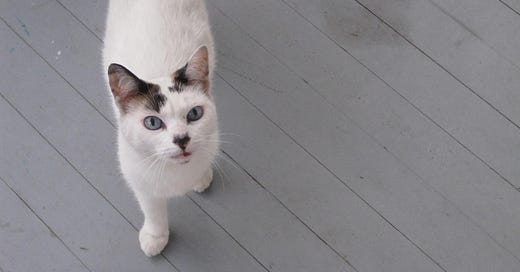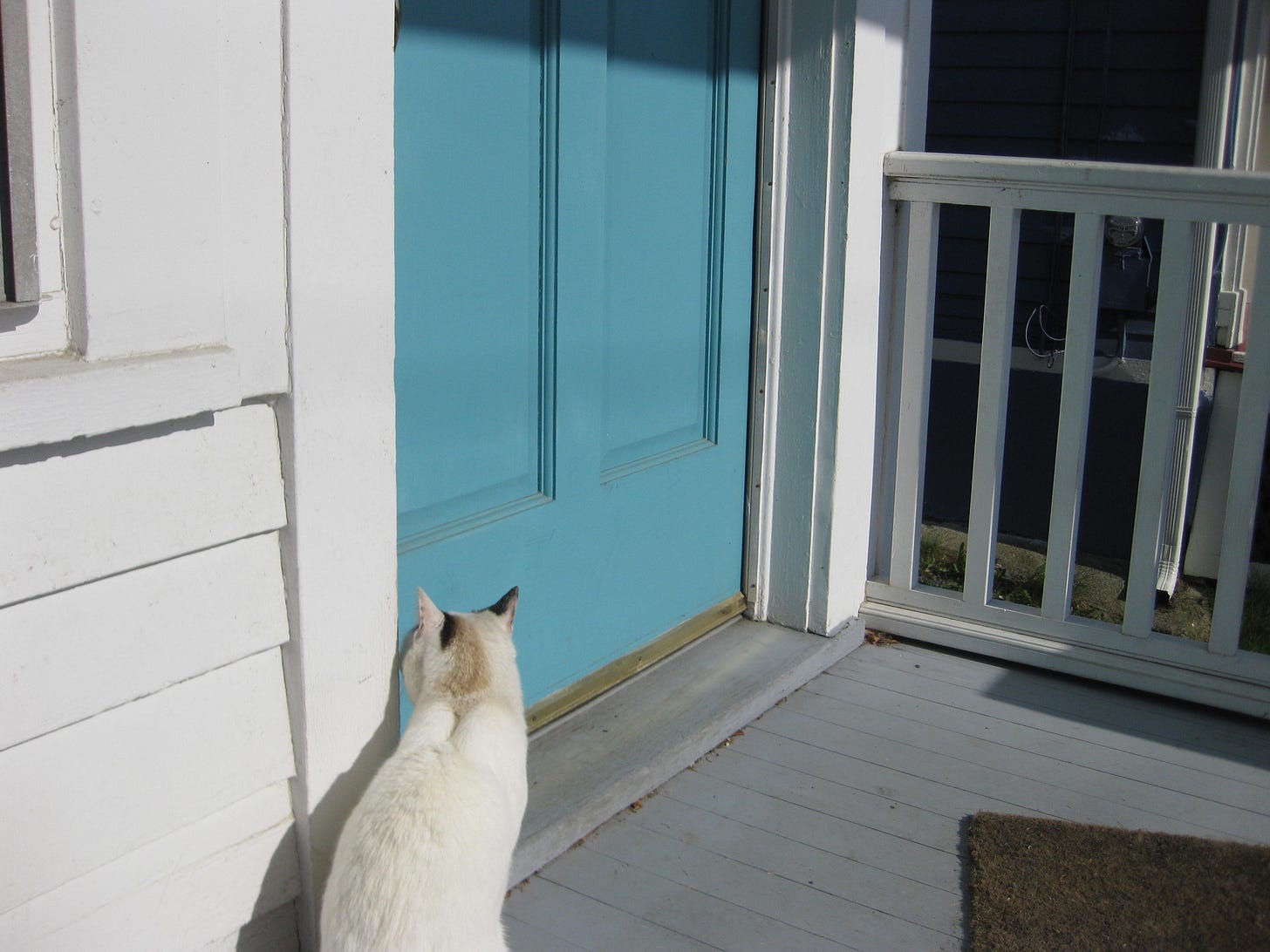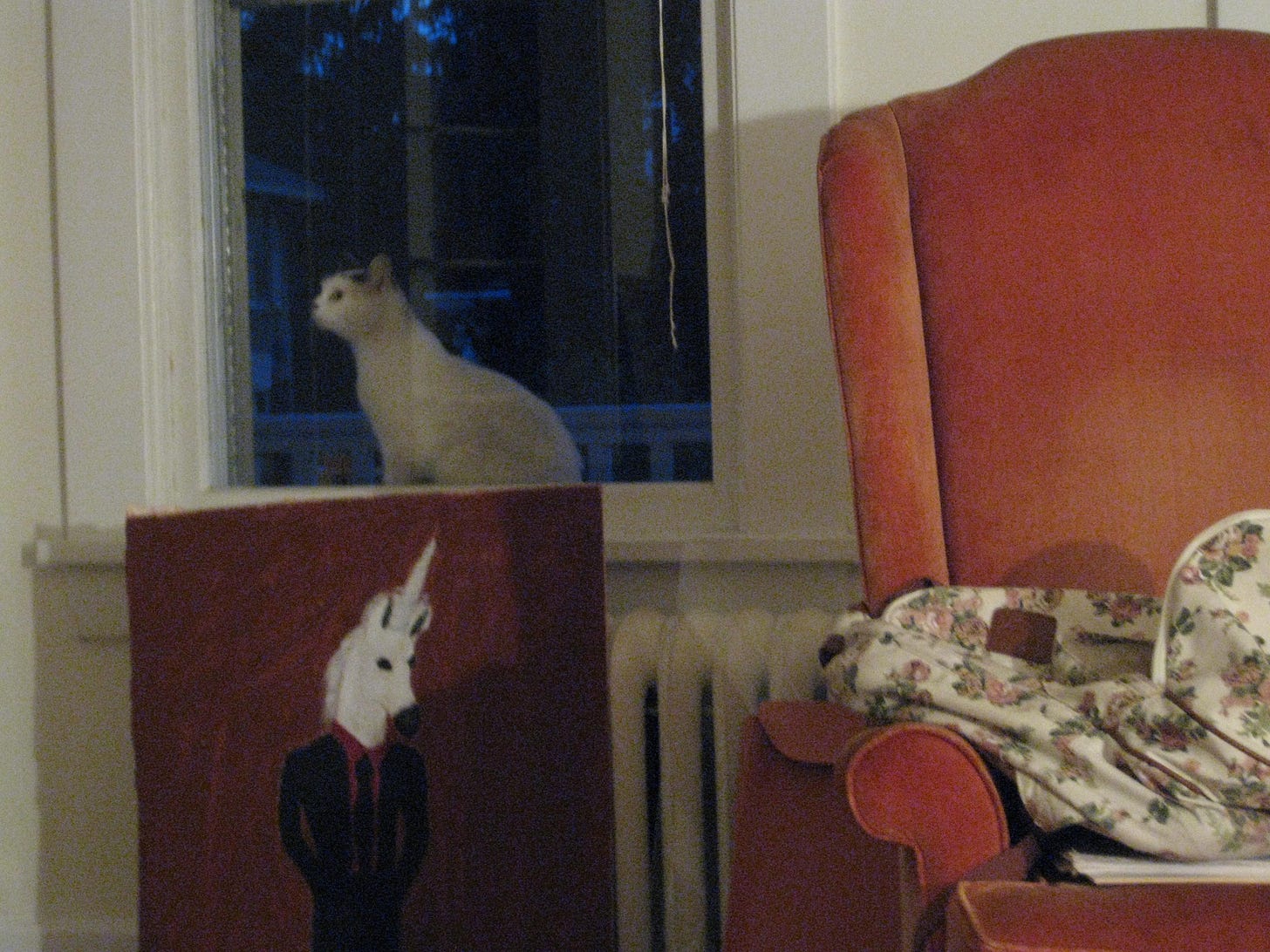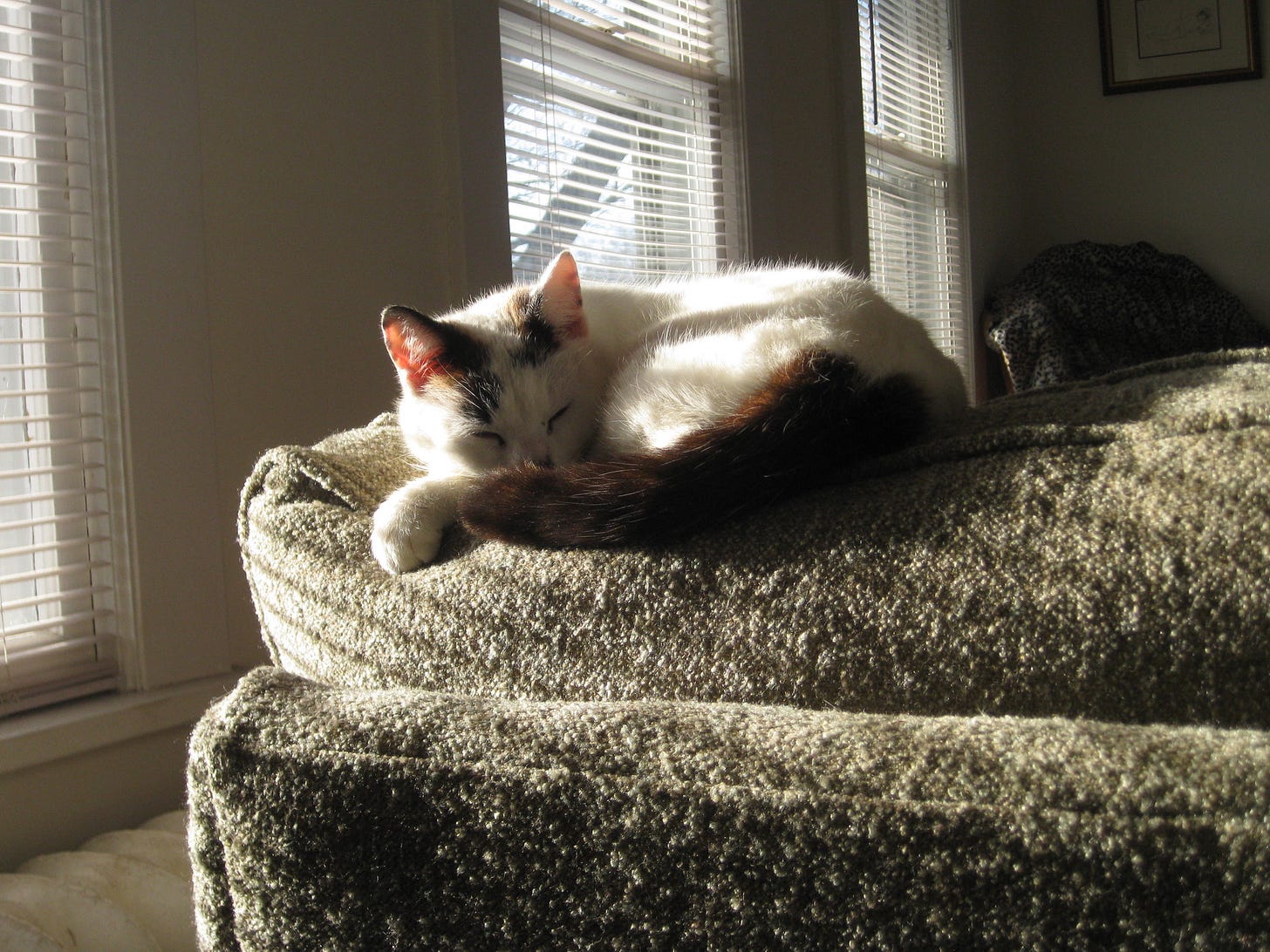The Year of the Cat
Elisabeth Donnelly looks back at a relationship with a wily cat during a lonely time in upstate New York.
In an old photo from when I lived in a house in Catskill, New York, on the edge of the Hudson River, I am asleep on the couch with a small cat curled up on my chest. The casual observer would be forgiven for thinking that it was my cat in this still life tableau: snoring woman, mouth wide open, head flung to the side, a red plaid blanket, and a cat in a circle as if it is right at home.
But the thing was, she wasn’t my cat. I didn’t feed her, I didn’t scoop her poop, I didn’t consistently provide her with a home and shelter. She was like a weedy, persistent, besotted lover who wouldn’t listen to the word “no,” who spent every night outside my house with a boombox in the air, playing “In Your Eyes.” Yet to explain it properly — my relationship with my fake cat — we have to back things up slightly.
***
It started with a move. Two years before, I traded Brooklyn for Albany, where my husband worked. I didn’t like living there. I had no friends and our apartment was riddled with mice. It was a city of empty buildings and sprawling ’80s-era shopping malls. I spent most of my days driving 45 minutes to suburban and rural towns like Hudson and Saratoga Springs, and sometimes crossing state lines to Great Barrington in Massachusetts — towns that had passable coffee, the occasional attractive college student, and the kind of flyer that made me view it as a thriving epicenter of culture.
After two years of this life, my husband and I decided to make a change. We were going to move to Hudson, 45 minutes down I-87, looking to live near more like-minded former city dwellers, and make our lives a little bit fuller and happier. In our search, we discovered that across the river, in Catskill, we could rent a full house on the banks of the Hudson River for the price of a small apartment in Hudson, the latter’s up-and-down economy driven by its growing Manhattan expat community of high-end antique store-owners and Bard students opening knick-knack crystal shops with names like “The Store.”
There was opportunity: musician and performance artist Melissa Auf der Maur had just opened an arts center in a former industrial factory, where they showed movies and put on concerts once the weather was nice. My favorite place in Hudson was literally a store that sold mounted animal heads, straightjackets, and used Chanel. It closed quickly.
She wasn’t my cat. She was like a weedy, persistent, besotted lover who wouldn’t listen to the word ‘no,’ who spent every night outside my house with a boombox in the air, playing ‘In Your Eyes.’
We moved to Catskill in May, when spring had arrived. There was something haunted about the town. Buildings once spectacular were now crumbling in disarray, fire traps with fading paint, bats flying from the rafters. Houses with widows’ walks had broken glass. It was like living in Bedford Falls 60 years later, after the banks closed and the jobs left town. There were some quirky, strange pockets of life: a cat sculpture made out of found wood that served as a “park” but to me it was more like a serial killer’s lair; a tiki-themed pirate bar with plastic tchotchkes in the basement of a historical house whose blue-and-gold Official New York State sign on the front lawn read “Uncle Sam was married here.”; a strange walled-off compound of a house of outrageous grandeur. On the days when the light hit at the right angle, you understood what it was like to live in a Thomas Cole painting.
The feeling of living in a town in decline was always precarious, as if one wrong move could lead to a tsunami of difficulties. Some days I worried about what I was doing, and whether this life was putting me on the right path, leading towards where I wanted to be in five years. A rumble of existential malaise colored what I saw. It felt like no coincidence that the bridge that took us over the Hudson to the titular town was named after Rip Van Winkle, the short story character who fell asleep for 20 years in the Catskills. I wanted to be in a city, feeling the energy, having enough friends that I could host a small dinner party and we could talk about really good books.
But despite the rumbling panic, my existential malaise quieted down to a rumble in the belly, a faint pang of hunger. After all, this was my home. I lived with the man I loved, and our hours together were idyllic. Trees were in bloom, the days were sunny and long, and we’d watch the sun set over the Catskills from the porch. I spent my days at home, making my living as a writer and editor, while my husband commuted back and forth to Albany to work in state government. We spent our mornings running up and down the back roads, finishing our jogs with a sprint across the bridge, and at night, we’d take a walk to the nearby park that spilled into the river, counting and identifying the stars.
Despite the ostensible happiness in this set-up, I couldn’t shake the near constant nagging feeling of loneliness. I’d say hi to my neighbors sometimes, but I didn’t know them. My family was four hours away in Boston; my friends were mostly three hours away in Brooklyn. It was a loneliness I could trace through my days with the choices I made: I would pitch and sell interviews with local artists and authors whose books I’d read, an effort to make friends with people with whom I had something in common. I thought, quite seriously, that if I got pregnant and had a baby, I’d have an instant in to the community of new moms, where I’d have a circle of friends who had mewling children as a conversation starter. I would drive long distances to haunt the nearest artsy town’s local coffee shop, hoping that my new best friend would walk through the doors and we’d instantly fall in love.
In other words, I was ripe for a seduction.
***
I remember the first time I saw her. She was being chased by a little girl in a pink princess gown, wearing a crown with a scepter in one hand. With her other hand, she was trying to grab the white cat by her tail. The cat was too fast for the little girl, and slipped under a fence, rolling in the dirt.
My husband and I became better acquainted with the cat when we’d walk around our neighborhood at night. She was a scraggly, dingy white waif, small, with a very triangular face. She had a black patch on her back and a slight English orphan air of sooty dirt surrounding her. She was always outside, no matter the hour. She’d come right up to us and purr a hello, looping around our legs. We had taken to calling her “Slut” for her charming ways, for the manner in which she’d go right after you, looking for approval. It was an in-joke that stuck. It was always fun to say “Hey Slut!” to a cat. Mimi — the name her owners called her, the name the little girl yelled that day — just felt wrong, like it didn’t fit.
She had marked us, like a vampire. She was waiting for her invitation, cultivating us with her charm. At sunset, she’d appear on our porch as we read. She would show off on the porch railings, purring and meowing, and we’d look up, in order to pet her or to say hello. She followed us around the block when we’d take walks after dinner, as faithful as a dog, only to stop short at the edge of her territory. We’d watch Slut stare down the glaring, rheumy-eyed white cat whose territory started at the monks’ compound. At night, once we were inside, we would be startled by rattles and thumpings, a rhythm played out by a bad drummer: it was the cat, throwing herself against one of our windows, trying to will her way into our house.
One of the white shingles on the house had a repetitive pattern on it, as if a child had placed its mud-covered thumbprint on it, over and over and over again. It was a series of pawprints, up a little bit too high, a record of her attempts to shake the walls and say hi.
I didn’t know why the cat was so obsessed with our place. I had assumed it was just a distaste for her own living situation. Across the street was one of those menageries of a house with dogs and birds and a whole cat family, a litter of kids, including the girl who would scream “Kitty!” and lunge for Slut’s tail every time she saw our friend.
Yet the cat’s obsession took on a weird cast: One night, when a bout of insomnia had rendered me useless as I worked in the office, a bat slipped into our house, flying through the open window. Once I noticed it, I screamed and ran into the bedroom, waking up my husband so he could swing at bat-windmills like a Don Quixote in boxer-briefs. It was 2 a.m. and we felt like the only people in the world. We ran down to the first floor, opening up the front door in an effort to steer the bat back out into the world, and what did we see but Slut, a little egg on our welcome mat. At that point I said, “Come in, cat, kill the bat!” but she stayed put, half-asleep. Waiting for us. It was the first time I had offered her the protection of the house, the first time I said that she could cross our welcome mat.
***
After that night, I cracked. I was home alone during the day. My only companionship was the Internet. I had my periods of feeling like Miss Havisham. My loneliness had taken on the shape of the house. I knew that Slut was out on the porch, meowing to be let in at about 9 o’clock, and it felt okay to let her inside. It was almost as if she was a friend. She liked being inside. She’d greet me by climbing on my legs, kneading her paws into the blanket I had over them, and then she would find a sun dappled spot on the sofa, circle around it for five minutes, and fall asleep, in a happy little crescent roll.
I flattered myself, thinking Slut wanted to be my friend. And why wouldn’t she? We hung out together on my couch. I had a nickname for her. And I never pulled her tail. But the real story, as my landlord told it, was that Slut was born in our house, spent her formative years there hunting for mice, and then moved across the street to live with her original owner’s daughter and her kids, including the little girl monster. The cat never quite took to the move. She haunted our house because she was always and forever trying to get back home.
There was something poetic about Slut’s search for a home. How she’d look for it with every passerby, how she knew that with enough time, we’d open our doors. As she spent time inside with me, providing warmth and cat sounds as I worked, we saw her more outside, too. One night, she started to do her usual trailing of us as we walked to the park on the Hudson River, only to venture past her territory. We expected her to stop short, but she was still there as we turned the bend, as we went down the dirt road. Our short walk became an exercise in getting the cat to come with us, even if it was someplace new. There was a little magic in the air that night — and then she went right back to her home, as if nothing had happened.
By the winter, I thought of her as my cat. My fake cat. My only real friend, after my husband. I could pet her when I was sad and I could talk to her and feel something simpatico. At this point, we were figuring out which sets of blankets and sheets were passable enough for the cat to ruin. We let her run rampant over our legs. We took pictures with her.
Maybe Slut was a fellow traveler, someone else looking for a home in a world that seemed mean and random. I had made the choice, a couple of years prior, to live a life beyond just finding the footholds of a job and a career, prioritizing love and letting the rest come later. I hadn’t figured out the exact balance quite yet. My family avoided me, considering me a slacker. I felt like a wanderer. I worried about the life we were building upstate: financially on the edge, and if I got pregnant, or found a job that had a future, we’d have fewer options, and I’d have to live in a place where I was miserable. I made the choice to live a boring, lonely life so that I could leave that life someday, and in retrospect, it was my own sort of stasis. I became someone different but I also limited my options of who I could be at that point in time, whether it was a farmer, a rural girl, or someone else.
In some ways I was a shell of myself, thinking that hard work would get me a dreamed-for big break opportunity, or book deal, and with that, I’d have the bicoastal, glamorous writing career of my dreams. Yet at the time I had no idea how to write well. My mother had cancer. I was developing a severe anxiety disorder — I had a panic attack while ostensibly relaxing in a spa with mineral baths. I almost got into a fight with another customer at an antique store. I listened to Kendrick Lamar’s Good Kid, M.A.A.D. City everytime I drove, and I mostly would cry.
I didn’t know what I was doing with my life. I didn’t know who I was or where I would be in five years. There was a part of me that was inspired by the single-minded purpose of Slut’s day to day life. She had a beautiful purity of intention. All she wanted to do was to sleep in the house that she was raised in. Who could find fault with that? I knew what we were doing was wrong. I felt bad for the cat’s family, for the little girl who never saw Slut out and about in the neighborhood because she was too busy hiding out in our house. We were in some sort of illicit relationship that involved Slut sleeping on my couch by the heart pillow with two long arms reaching out for a hug, while I’d take photos that I’d send to my family.
I justified our relationship as one of the few things I enjoyed at this point in my life. I knew that if I closed the door to Slut, she’d still come around, still beg to be let inside. I figured it couldn’t be that bad if I was giving her what she needed. And obviously I benefited from the relationship too. I could pet a cat daily. I could hear her purring.
***
In the fall of 2013, according to the news, a storm was coming. Hurricane Sandy had hit the year before, and the Catskills area was still recovering from Hurricane Irene in 2011, a hundred-year storm that flooded many towns, with houses lost in mudslides and destruction throughout the community. To say that we were braced for something big was an understatement. Hurricanes were threats to take seriously. However, in our case, our house was located on the center of a W. If trouble hit, it would be more likely to come from downed trees. The hype around the storm was scary — who knew what would happen? My husband and I hunkered down in our home for the weekend with an ungodly amount of food and matches at the ready. The wind lashed the windows, the rain poured down angrily. The storm was severe, formidable, not to be messed with. The sky was a brute purple.
Then we heard a familiar meow at the door.
It was Slut, trying to wait out the storm with us. Letting her in felt wrong, a bad chord made worse by our neighbor’s yells of “Mimi! Mimi! Come on inside!” I took the cat across the street and knocked on the door. My neighbor smiled, looking at the animal as if she was a naughty schoolgirl. I apologized, but it was a weak apology.
I was done keeping secrets. Our affair was now out in the open.
***
In the ongoing months, we tried to be a little less charming to Slut. She had a home. She had people to feed her. And if I thought about it, really thought about it: it wasn’t fair to the family, despite the fact that I was alone and lonely in Catskill, much of the time.
The secret frisson, the thrill of our illicit relationship wore off. Slut still came around, but she seemed a little less charming, a little more likely to stay at her own house. And I missed her.
My loneliness had taken on the shape of the house. I knew that Slut was out on the porch, meowing to be let in at about 9 o’clock, and it felt okay to let her inside.
Winter was coming. Every month our lives changed radically. I’d slip over to a coffeeshop in Hudson for the day, but I still failed miserably at making friends. During Halloween I supplied the candy for the kids coming into the coffeeshop — the employees had forgotten to do it — and I got just a small thanks in response. I was trailed into the coffeeshop another time by the owner of a fancy cheese shop who was convinced I had stolen a ten-dollar chocolate bar in my browsing. (I had merely touched it.) This led to the cheese shop owner and the coffee shop owner fighting at the counter — “Don’t harass my customers in my store!” “Don’t speak to me with that language!” — but I was still embarrassed and falsely accused.
Small things added up. When our lease ended, we knew we were moving out of Catskill, back into a city. We threw a going-away party with an embarrassing number of attendees. The last guy at the party was a guy who had seen the invitation on Facebook, who worked for Andrew Cuomo. My husband and I awkwardly chatted with him about the nuances of speechwriting as we waited for this guy to head back home. We didn’t know him. It was kind of fitting that he was our final visitor.
As our days filled with boxes and organizing, with visions of a very different future in our heads, Slut pulled away from us. She stopped coming over. She had no interest in the house anymore. She would spend her days outside, looking at us.
In a different world, Slut would have been part of my life for years. Our landlord had offered to sell us the house. It would’ve been a good opportunity for a summer place, but we didn’t have any amount of money to even consider the offer. Once we were gone from Catskill, we were gone. I was going to miss the porch. I was going to miss nature. I was going to miss taking walks at night and counting the stars. I was going to miss this period in my life, even though I was terrifically excited about the future.
Above all, I was going to miss Slut. I knew that. And I wanted to think that she knew it too, in some way. Even before our house filled up with boxes, she pulled a slow fade on us. She stopped coming around our door and she stopped trying to charm us. Our relationship was over before I knew it, over before my husband and I could disappear, turning into just another family that had lived in the house she grew up in for a year of her life. She had seen people come and go from 8 Liberty Street.
She knew how our story would end.










Beautifully written. Your descriptions of the area are so familiar to me I wondered if it was my Catskill neighborhood. No wonder, because I live at 9 Liberty! Was that where Slut’s family lived?
I enjoyed this piece about Slut! I loved it, actually. Had a cat many years ago that looked nearly identical to her. She lived with me for 17 years. Thanks for reminding me of her this afternoon.